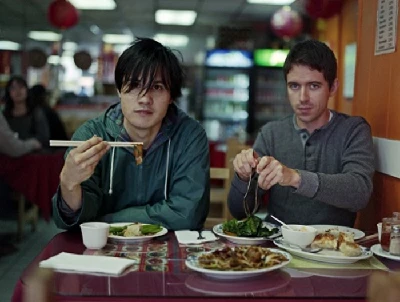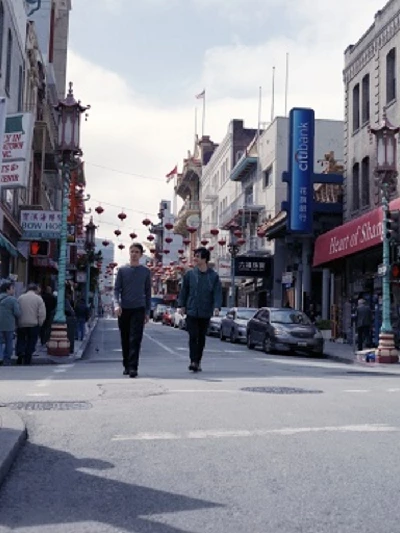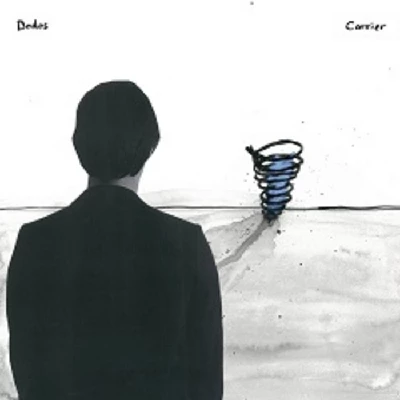Dodos
-
Interview
published: 31 /
8 /
2013

Ben Howarth speaks to breezy San Francisco folk duo Dodos' guitarist and singer Meric Long about the death of their touring guitarist Chris Reimer last yeaar and their just released fifth album, 'Carrier'
Article
I first heard the Dodos only after a recommendation from my fellow Pennyblackmusic writer Mark Rowland, having missed their first UK shows and initially missed out on their highly acclaimed 2008 album 'Visitor'. I made up for that with their third album, 'Time to Die'. There are very few albums I have listened to more since 2010.
Now back with their fifth album, 'Carrier', the Dodos have made an album that easily matches their earlier work, combining the intricate guitar work that made 'Visitor' such a hit with critics and the breezy melodies that made later albums so enjoyable. For the first time, the songs are recorded almost entirely on electric guitar – but fans of Meric Long's busy fingerpicking and Logan Kroeber's hypnotic drum fills will not be disappointed.
“You catch me on the day that the album is released over here,” Meric tells me over the phone from his home in San Francisco. It is therefore a little too early to assess how others have reacted to it, and Meric confesses that – with the duo already well advanced on their next record – he doesn't really know how he feels about it.
The album was made at a difficult time for the band, with their touring guitarist Chris Reimer passing away in 2012, as work began on these songs. Other difficulties in their personal lives made the pair briefly consider not carrying on with the band, but having chosen to make another album they were determined to begin afresh – and approach the band in new ways, with Meric determined to adopt brand new approaches to writing songs.
This album also appears on a new label, Polyvinyl. “Everyone we worked with at French Kiss and Wichita was great, but we felt like we wanted this album to be different from what we had done before, and the label was part of that,” Meric explains. “We knew bands who had worked with Polyvinyl, and had nothing but good things to say about. Right from the start, they were really enthusiastic about working with us, and that was really important in the decision.”
I tell Meric that I've found the album more immediately accessible than its predecessor, and that it reminds me more of the band's third album 'Time to Die', with its more direct sound and focus around clear melodies. I suggest it has some of the band's most radio-friendly sounding sounds, and he seems surprised – saying that he hadn't thought of the songs like that.
ML: This album I was very deliberately trying to make it more about the songs. I spent more time working on the songs on my own before we started to arrange them for the band. For me, the last record, 'No Color', really felt like a pop record. I was really going for that – I wanted to have big melodies.
PB: Quite a lot of singalong moments, as well...
ML: This time around, it was different. I mean, it's great if you can hear those qualities in these songs, but it wasn't where I was coming from at all.
PB: Maybe I wouldn't define it as poppy – I would just say that these songs are very memorable, I felt like I knew them really well after a few listens.
ML: Don't get me wrong, there is nothing wrong with pop! I love pop.
PB: You mentioned beforehand there that you did more work on the songs in advance of recording them than before. Do you typically write songs with a guitar in your hand, and begin forming them once you have come up with a guitar part – or would you always have ideas for lyrics first?
ML: In the past, the songs had almost always started with a guitar part – or with a drumbeat. I would always have those two things figured out before any lyrics came into play, but that was one of the things I was trying to do differently this time. In the past, the words had to fit inside of the song, and it began to feel so limiting.
So this time, I really tried to focus on writing words, and I think I did see another side to the way I can write. I was able to write about things I would never have considered making into a song before. It might sound funny, but I kind of discovered poetry for the first time. It was probably the first time I had thought about words without also thinking about the music, and I realised, "Oh, I can do whatever I want."
That doesn't mean that I had every single word completely worked out before I started playing the music, but I had verses and strong phrases that I knew I would base the songs around. It meant I was able to really trust the song, as I knew I had lyrics I was happy with, and it made it a lot easier.
PB: And then, once you've started arranging the songs with the two of you, and any extra musicians you may be working with, how much does working with other people change the way those songs sound?
ML: It doesn't change that much, usually. But to give you an example, on 'Transformer', which was the first song I started working on for the record, the challenge was to find the right drum beat that worked with my guitar part. I had about three different versions of that song, and then it was about finding the approach that worked best. But, I wouldn't normally change the way that I had worked out the songs very much once we start to work on them and to record them.
In the past, there were songs that came out of ideas the two of us had when we were playing around. But, this time, the songs were pretty much ready to go and it was a case of working out the right drum parts and recording them. One of the reasons for that was that I wanted to have songs that I could play outside of a band setting. There were no songs on 'No Color' that I could just sit down with a guitar and play. That's fine, but this time I really wanted to be able to sit down and play the record for myself and anybody else.
PB: Do you ever play on your solo gigs?
ML: No, not really. I did one show, with a friend, where I played solo. It was interesting – I did enjoy it. But it's not something I want to do regularly – I don't have a particular desire to do it more often, but I did enjoy the feeling of not having a grid. It meant I could stretch the songs out as I wanted without having to make sure they fitted into what everyone else was doing.
One of the concepts that we did talk about when we started doing another record was doing one with no drums. Logan plays loads of instruments. He is not just a drummer, and we did consider him playing those and not having any drums at all. In the end, I think we thought that people would want the drums to be there, but it's still something we might do in the future.
PB: You mentioned that you are already some way towards finishing the next album. Are songs without drums being considered for that album?
ML: Not now, no. When we finished 'Carrier' I think we wanted to take that approach. We really wanted to focus on a particular style of song, and see where we can take it. That album was the first time we had been in that studio and worked with that producer, and it felt like we spent most of the time learning how we should be recording. So the reason for starting another album so quickly was that we wanted to have an album where we begun with the feeling we had at the end of the album – where we felt comfortable and knew how it was going to work from the beginning. By the end of 'Carrier', we were feeling really good about the studio and we wanted to have that for the whole album.
PB: What prompted you to change where you recorded and move into a new studio?
ML: We had never recorded in San Francisco before, which was kind of ridiculous as it is where we are both from. We wanted to be nearer home, this time. I wanted to be near my wife, and I didn't want to have that experience where you pack your bags and head off somewhere, and then you spend all your time in the studio.
PB: One thing that stayed the same is that you worked with the Magik*Magik Orchestra. Tell me how you got to know them?
ML: Well, Minna Choi, who composes all the parts for them, contacted me a few years ago about doing a show together. She put together a thirty piece orchestra and we did two shows, and it was awesome. Logan and I were in the middle of the orchestra, and it just felt incredible to play those shows. So she did some arrangements on 'No Color', and then, this time around, it was even easier because they are actually the in-house orchestra for the studio. It was one of the reasons we decided to record there.
Over the time we have worked with her, I have come to really trust her approach. It's not that we don't talk at all about the music, but really, I do just give her the songs and let her do what she wants with them. It is very rare that I don't like the ideas she brings up for the songs.
PB: Do you have similar relationships with other musicians, as well? You worked with a vibraphone player on the last two albums, for example.
ML: To be honest, not really. We are actually rehearsing with Joe at the moment, and he is going to come and play guitar and do some vocals when we tour. Everyone brings there own approach to the music, and you need room for that, but – although I don't really like to do it – I do find that, when I want the music to sound a certain way, I need it be exactly that.
We had Neko Case come and do backing vocals on the last album, and you obviously don't tell Neko Case what to do. I just let her do her thing! She just came in, and shredded. It was awesome – beyond anything that I can even comment on. But, when it came to the vibraphones, it had to be a certain way.
Maybe other people didn't feel like I was being controlling though. It's hard to really know.
PB: As you have mentioned the new live show, I wanted to ask what it was like. I know you will be in London in November as part of your European tour. On the 'No Color' tour, I was surprised by how powerful your set was, a real heavy rock show. Much more than when you toured 'Time to Die'. Can we expect the same again?
ML: Well, as I say we are working with Joe at the moment. Right now, we are really working on vocals. It's great that Joe is keen to do the vocal parts, because not everyone wants to take the risk of playing and singing at the same time. We have never been able to have the harmonies come out when we play live, so that will be a new angle to the sound that we haven't been able to do.
PB: That sound great – makes me look forward to November even more! Thank you.
Band Links:-
https://www.facebook.com/dodosmusic/
http://www.dodosmusic.net/
https://twitter.com/TheDodos
https://instagram.com/dodosmusic/
Picture Gallery:-

